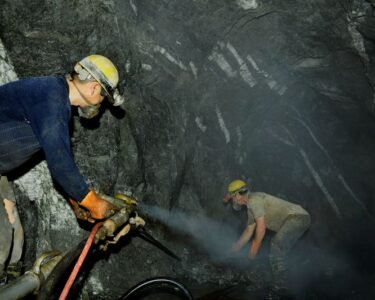As speculation grows about a possible second Trump presidency, one key area where President Trump policies could have a major impact is critical metals, essential minerals like lithium, cobalt, and rare earths that power everything from electric vehicles to advanced defense systems. As Trump presidency starts unloading its bombshells, President Trump is already using trade tariffs, diplomatic pressure, and aggressive commercial negotiations to reshape the global supply chain in favor of U.S. interests.
Rather than strengthening existing strategic alliances such as the Minerals Security Partnership, Trump’s approach will likely focus on using tariffs, threats of trade restrictions, and economic pressure on emerging nations to force better deals for U.S. companies and supply chains. He has just done it this week with Mexico imposing a 25% blank tariff, bringing the Mexico President to an emergency call to re-negotiate this agreement, while also offering to deploy the Mexico military to prevent illegal migration to the US.
Tariffs as a negotiating weapon
Trump has historically used tariffs not just as economic tools, but as bargaining chips in broader geopolitical negotiations. In his first term, he imposed sweeping tariffs on China, citing national security concerns over critical minerals and manufacturing. His administration classified rare earths as “essential for defense,” signaling that access to these materials is a matter of national security rather than just economics.
As Trump’s administration accelerates the deployment of its America’s First policies, Trump’s team would likely double down on this approach, threatening additional tariffs on foreign mineral imports to push U.S. allies and more fragile economies into making concessions. This could include:
- Pressuring Canada and Australia—both major players in the global critical metals markets, to offer the U.S. preferential supply agreements.
- Strong-arming African nations like the Democratic Republic of Congo (which produces 70% of the world’s cobalt according to the Cobalt Institute) into securing more favorable contracts for U.S. companies by tying aid or trade deals to mineral access.
- Exerting influence over Latin American lithium producers (such as Chile and Argentina) by linking trade benefits or potential sanctions relief to better terms for U.S. investors. The strong friendship between President Trump and Argentine President Milei will certainly help.
China: The central battleground
China currently dominates the global supply chain for rare earth processing and battery materials, refining around 85% of the world’s rare earths (Belmont Metals). Trump has consistently positioned China as America’s top economic adversary, and during President Trump second term we would likely see tougher restrictions on Chinese mineral imports.
Instead of trying to fully reshore mining operations, which would take decades, Trump would use the threat of tariffs and export bans to force China into more favorable trading terms. This could involve:
- Demanding China sell processed rare earths at lower prices to U.S. buyers in exchange for reduced tariffs on other goods.
- Blocking Chinese investments in U.S. mining projects while pressuring Beijing to relax its own restrictions on exporting critical metals.
- Expanding sanctions on Chinese mining companies operating in Africa to disrupt their supply chains and push local governments toward U.S.-backed alternatives.
Leveraging Ukraine and US foreign aid
Trump has already signaled that he views Ukraine’s vast mineral resources as a bargaining chip in negotiations over U.S. military aid. Ukraine holds significant reserves of lithium, titanium, and rare earths, making it a potential future powerhouse in the global critical metals market.
The Trump presidency has already signaled this week conditional support to Ukraine in exchange for preferential access to its mineral wealth. Rather than providing unrestricted aid, Trump is pushing Ukraine to sign exclusive extraction or processing deals with American companies, limiting European and Chinese involvement in its resource sector.
Deep-Sea mining and resource expansion
Another avenue Trump may pursue is deep-sea mining, a sector where the U.S. has lagged behind China. The deep ocean floor contains massive untapped reserves of nickel, cobalt, and rare earths, and Trump’s business-friendly, deregulation-driven approach could lead to the U.S. expanding its role in this emerging industry. Given Trump’s recent interest in acquiring Greenland (which has vast mineral deposits), during Trump’s second term we would see renewed efforts to secure access to mineral-rich territories through direct U.S. investment or diplomatic pressure.
Saudi Arabia and Gulf states: Economic pressure for favorable deals
Saudi Arabia and the UAE have massive sovereign wealth funds actively investing in global mining ventures. Trump, who maintains very strong ties to Saudi leaders, could use these relationships to funnel investment into U.S. critical mineral projects.
With Jared Kushner’s deep connections to the Saudi Public Investment Fund (PIF), Trump could push for:
- Saudi-backed U.S. mining projects in exchange for military and economic benefits.
- Preferential mineral supply deals with the Gulf States, reducing reliance on China.
- A broader energy-for-minerals deal, leveraging the U.S.-Saudi oil relationship to secure critical metals supply.
It is important to note that Saudi’s Crown Prince MBS, has already committed at least $600 billion (CBS News) to invest in the US to promote the US and Saudi business partnership, probably across AI, Tech and Defense sectors.
Deregulation and private sector acceleration
Beyond foreign policy, Trump is going slash environmental regulations and speed up mining approvals. The current U.S. mining permit process takes an average of 29 years, a timeline Trump has repeatedly criticized.
The new Trump administration is likely to:
- Fast-track key mining projects in the U.S., particularly in Minnesota, Nevada, and Alaska.
- Roll back environmental restrictions on projects currently blocked due to concerns over Indigenous land rights and ecological impact.
- Offer incentives for U.S. corporations like Tesla and Apple to invest in domestic mineral processing rather than outsourcing to China.
Conclusion: A hardball approach to critical metals
President Trump is likely to reshape global critical metals policy through economic coercion, aggressive trade tactics, and deregulation rather than traditional diplomacy.
Instead of forming new alliances, Trump will likely walk away from old partnership agreements with the Europeans, and instead, use tariffs, economic threats, and aid leverage to extract better deals from resource-rich nations. This approach could lead to cheaper, more secure access to critical metals for the U.S., but also risks trade conflicts, supply chain instability, and heightened geopolitical tensions, especially with China and developing nations reliant on mineral exports.




